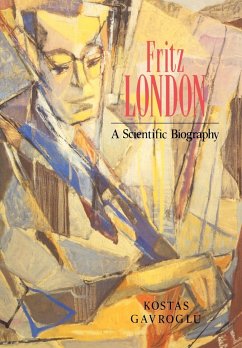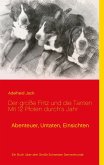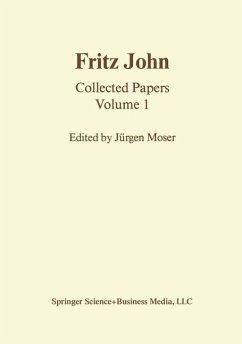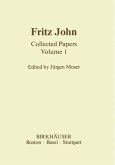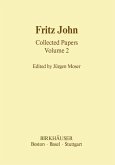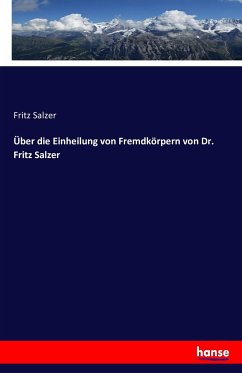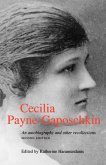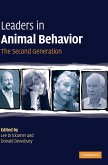Kostas Gavroglu
Fritz London
Kostas Gavroglu
Fritz London
- Broschiertes Buch
- Merkliste
- Auf die Merkliste
- Bewerten Bewerten
- Teilen
- Produkt teilen
- Produkterinnerung
- Produkterinnerung
Fritz London was one of the twentieth century's key figures in the development of theoretical physics and chemistry. A quiet and self-effacing man, he was one of the founders of quantum chemistry, and was also the first to suggest that superconductivity and superfluidity could be viewed as macroscopic quantum phenomena. This thoroughly researched biography gives a detailed account of London's life and work, and, by following his correspondence with other leading physicists and chemists (such as Erwin Schrodinger, Walter Heitler, Max Born, John Bardeen, Max von Laue and Brian Pippard), examines…mehr
Andere Kunden interessierten sich auch für
![Der große Fritz und die Tanten - Mit 12 Pfoten durch's Jahr Der große Fritz und die Tanten - Mit 12 Pfoten durch's Jahr]() Adelheid JackDer große Fritz und die Tanten - Mit 12 Pfoten durch's Jahr5,99 €
Adelheid JackDer große Fritz und die Tanten - Mit 12 Pfoten durch's Jahr5,99 €![Fritz John Fritz John]() Fritz John229,99 €
Fritz John229,99 €![Fritz John Fritz John]() Fritz John153,99 €
Fritz John153,99 €![Fritz John Collected Papers Fritz John Collected Papers]() Fritz John Collected Papers229,99 €
Fritz John Collected Papers229,99 €![Über die Einheilung von Fremdkörpern von Dr. Fritz Salzer Über die Einheilung von Fremdkörpern von Dr. Fritz Salzer]() Fritz SalzerÜber die Einheilung von Fremdkörpern von Dr. Fritz Salzer12,90 €
Fritz SalzerÜber die Einheilung von Fremdkörpern von Dr. Fritz Salzer12,90 €![Cecilia Payne-Gaposchkin Cecilia Payne-Gaposchkin]() Cecilia Payne-GaposchkinCecilia Payne-Gaposchkin66,99 €
Cecilia Payne-GaposchkinCecilia Payne-Gaposchkin66,99 €![Leaders in Animal Behavior Leaders in Animal Behavior]() Lee DrickamerLeaders in Animal Behavior116,99 €
Lee DrickamerLeaders in Animal Behavior116,99 €-
-
-
Fritz London was one of the twentieth century's key figures in the development of theoretical physics and chemistry. A quiet and self-effacing man, he was one of the founders of quantum chemistry, and was also the first to suggest that superconductivity and superfluidity could be viewed as macroscopic quantum phenomena. This thoroughly researched biography gives a detailed account of London's life and work, and, by following his correspondence with other leading physicists and chemists (such as Erwin Schrodinger, Walter Heitler, Max Born, John Bardeen, Max von Laue and Brian Pippard), examines the process by which scientific theories become legitimized.
Hinweis: Dieser Artikel kann nur an eine deutsche Lieferadresse ausgeliefert werden.
Hinweis: Dieser Artikel kann nur an eine deutsche Lieferadresse ausgeliefert werden.
Produktdetails
- Produktdetails
- Verlag: Cambridge University Press
- Seitenzahl: 324
- Erscheinungstermin: 30. September 2005
- Englisch
- Abmessung: 244mm x 170mm x 18mm
- Gewicht: 562g
- ISBN-13: 9780521023191
- ISBN-10: 052102319X
- Artikelnr.: 22054554
- Herstellerkennzeichnung
- Libri GmbH
- Europaallee 1
- 36244 Bad Hersfeld
- gpsr@libri.de
- Verlag: Cambridge University Press
- Seitenzahl: 324
- Erscheinungstermin: 30. September 2005
- Englisch
- Abmessung: 244mm x 170mm x 18mm
- Gewicht: 562g
- ISBN-13: 9780521023191
- ISBN-10: 052102319X
- Artikelnr.: 22054554
- Herstellerkennzeichnung
- Libri GmbH
- Europaallee 1
- 36244 Bad Hersfeld
- gpsr@libri.de
Preface
Acknowledgements
Part I. From Philosophy to Physics: The years that left nothing unaffected
1. The appeal of ideas
2. Goëthe as a scientist
3. How absolute is our knowledge?
4. How do we come to know things?
5. London's teachers in philosophy
6. Husserl's teachings
7. Expectations of things to come
8. The thesis in philosophy
9. Tolman's principle of similitude
10. The necessary clarifications
11. Work on quantum theory
12. Transformation theory
13. Unsuccessful attempts at unification
Part II. The Years in Berlin and the Beginnings of Quantum Chemistry: The mysterious bond
14. London in Zürich
15. Binding forces
16. The Pauli principle
17. Reactions to the Heitler-London paper
18. Polyelectronic molecules and the application of group theory to problems of chemical valence
19. Chemists as physicists?
20. London's first contacts in Berlin
21. Marriage
22. Job offers
23. Intermolecular forces
24. The book which could not be written
25. Leningrad and Rome
26. Difficulties with group theory
27. Linus Pauling's resonance structures
28. Robert Mulliken's molecular orbitals
Part III. Oxford and Superconductivity: The rise of the Nazis
29. Going to Oxford
30. Lindemann, Simon and Heinz London
31. Electricity in the very cold
32. The end of old certainties
33. The thermodynamic treatment
34. The theory of Fritz and Heinz London
35. Initial reactions by von Laue
36. The discussion at the Royal Society
37. Termination of the ICI fellowship
Part IV. Paris and Superfluidity: The Front Populaire
38. The article in Nature 1937 and 'Nouvelle Conception'
39. Laue again
40. The structure of solid helium
41. The peculiar properties of helium
42. Bose-Einstein condensation
43. The note in Nature
44. The two-fluid model
45. The trip to Jerusalem
46. Leaving again
47. The observer in quantum mechanics
Part V. United States and the Typing up of Loose Ends: Duke University, North Carolina
48. The Soviet Union, Kapitza and Landau
49. The war years
50. The 1946 Cambridge Conference
Unsettled and unsettling issues in superfluidity and superconductivity
51. Heisenberg's theory and London's program for a microscopic theory
52. More problems with Laue
Hopeful signs from helium-3
53. 'Second sound' at very low temperatures
54. Writing Superfluids
55. The trip to Europe
56. Some developments in superconductivity
57. An ugly finale
58. Could Landau be right?
59. The worrisome realities of the post-war era
60. The second volume of Superfluids
61. William Fairbank
62. Further developments
63. The Lorentz Model
64. Consultantship at Los Alamos and the interview for security clearance
65. The last days
List of publications of Fritz London
Bibliography.
Acknowledgements
Part I. From Philosophy to Physics: The years that left nothing unaffected
1. The appeal of ideas
2. Goëthe as a scientist
3. How absolute is our knowledge?
4. How do we come to know things?
5. London's teachers in philosophy
6. Husserl's teachings
7. Expectations of things to come
8. The thesis in philosophy
9. Tolman's principle of similitude
10. The necessary clarifications
11. Work on quantum theory
12. Transformation theory
13. Unsuccessful attempts at unification
Part II. The Years in Berlin and the Beginnings of Quantum Chemistry: The mysterious bond
14. London in Zürich
15. Binding forces
16. The Pauli principle
17. Reactions to the Heitler-London paper
18. Polyelectronic molecules and the application of group theory to problems of chemical valence
19. Chemists as physicists?
20. London's first contacts in Berlin
21. Marriage
22. Job offers
23. Intermolecular forces
24. The book which could not be written
25. Leningrad and Rome
26. Difficulties with group theory
27. Linus Pauling's resonance structures
28. Robert Mulliken's molecular orbitals
Part III. Oxford and Superconductivity: The rise of the Nazis
29. Going to Oxford
30. Lindemann, Simon and Heinz London
31. Electricity in the very cold
32. The end of old certainties
33. The thermodynamic treatment
34. The theory of Fritz and Heinz London
35. Initial reactions by von Laue
36. The discussion at the Royal Society
37. Termination of the ICI fellowship
Part IV. Paris and Superfluidity: The Front Populaire
38. The article in Nature 1937 and 'Nouvelle Conception'
39. Laue again
40. The structure of solid helium
41. The peculiar properties of helium
42. Bose-Einstein condensation
43. The note in Nature
44. The two-fluid model
45. The trip to Jerusalem
46. Leaving again
47. The observer in quantum mechanics
Part V. United States and the Typing up of Loose Ends: Duke University, North Carolina
48. The Soviet Union, Kapitza and Landau
49. The war years
50. The 1946 Cambridge Conference
Unsettled and unsettling issues in superfluidity and superconductivity
51. Heisenberg's theory and London's program for a microscopic theory
52. More problems with Laue
Hopeful signs from helium-3
53. 'Second sound' at very low temperatures
54. Writing Superfluids
55. The trip to Europe
56. Some developments in superconductivity
57. An ugly finale
58. Could Landau be right?
59. The worrisome realities of the post-war era
60. The second volume of Superfluids
61. William Fairbank
62. Further developments
63. The Lorentz Model
64. Consultantship at Los Alamos and the interview for security clearance
65. The last days
List of publications of Fritz London
Bibliography.
Preface
Acknowledgements
Part I. From Philosophy to Physics: The years that left nothing unaffected
1. The appeal of ideas
2. Goëthe as a scientist
3. How absolute is our knowledge?
4. How do we come to know things?
5. London's teachers in philosophy
6. Husserl's teachings
7. Expectations of things to come
8. The thesis in philosophy
9. Tolman's principle of similitude
10. The necessary clarifications
11. Work on quantum theory
12. Transformation theory
13. Unsuccessful attempts at unification
Part II. The Years in Berlin and the Beginnings of Quantum Chemistry: The mysterious bond
14. London in Zürich
15. Binding forces
16. The Pauli principle
17. Reactions to the Heitler-London paper
18. Polyelectronic molecules and the application of group theory to problems of chemical valence
19. Chemists as physicists?
20. London's first contacts in Berlin
21. Marriage
22. Job offers
23. Intermolecular forces
24. The book which could not be written
25. Leningrad and Rome
26. Difficulties with group theory
27. Linus Pauling's resonance structures
28. Robert Mulliken's molecular orbitals
Part III. Oxford and Superconductivity: The rise of the Nazis
29. Going to Oxford
30. Lindemann, Simon and Heinz London
31. Electricity in the very cold
32. The end of old certainties
33. The thermodynamic treatment
34. The theory of Fritz and Heinz London
35. Initial reactions by von Laue
36. The discussion at the Royal Society
37. Termination of the ICI fellowship
Part IV. Paris and Superfluidity: The Front Populaire
38. The article in Nature 1937 and 'Nouvelle Conception'
39. Laue again
40. The structure of solid helium
41. The peculiar properties of helium
42. Bose-Einstein condensation
43. The note in Nature
44. The two-fluid model
45. The trip to Jerusalem
46. Leaving again
47. The observer in quantum mechanics
Part V. United States and the Typing up of Loose Ends: Duke University, North Carolina
48. The Soviet Union, Kapitza and Landau
49. The war years
50. The 1946 Cambridge Conference
Unsettled and unsettling issues in superfluidity and superconductivity
51. Heisenberg's theory and London's program for a microscopic theory
52. More problems with Laue
Hopeful signs from helium-3
53. 'Second sound' at very low temperatures
54. Writing Superfluids
55. The trip to Europe
56. Some developments in superconductivity
57. An ugly finale
58. Could Landau be right?
59. The worrisome realities of the post-war era
60. The second volume of Superfluids
61. William Fairbank
62. Further developments
63. The Lorentz Model
64. Consultantship at Los Alamos and the interview for security clearance
65. The last days
List of publications of Fritz London
Bibliography.
Acknowledgements
Part I. From Philosophy to Physics: The years that left nothing unaffected
1. The appeal of ideas
2. Goëthe as a scientist
3. How absolute is our knowledge?
4. How do we come to know things?
5. London's teachers in philosophy
6. Husserl's teachings
7. Expectations of things to come
8. The thesis in philosophy
9. Tolman's principle of similitude
10. The necessary clarifications
11. Work on quantum theory
12. Transformation theory
13. Unsuccessful attempts at unification
Part II. The Years in Berlin and the Beginnings of Quantum Chemistry: The mysterious bond
14. London in Zürich
15. Binding forces
16. The Pauli principle
17. Reactions to the Heitler-London paper
18. Polyelectronic molecules and the application of group theory to problems of chemical valence
19. Chemists as physicists?
20. London's first contacts in Berlin
21. Marriage
22. Job offers
23. Intermolecular forces
24. The book which could not be written
25. Leningrad and Rome
26. Difficulties with group theory
27. Linus Pauling's resonance structures
28. Robert Mulliken's molecular orbitals
Part III. Oxford and Superconductivity: The rise of the Nazis
29. Going to Oxford
30. Lindemann, Simon and Heinz London
31. Electricity in the very cold
32. The end of old certainties
33. The thermodynamic treatment
34. The theory of Fritz and Heinz London
35. Initial reactions by von Laue
36. The discussion at the Royal Society
37. Termination of the ICI fellowship
Part IV. Paris and Superfluidity: The Front Populaire
38. The article in Nature 1937 and 'Nouvelle Conception'
39. Laue again
40. The structure of solid helium
41. The peculiar properties of helium
42. Bose-Einstein condensation
43. The note in Nature
44. The two-fluid model
45. The trip to Jerusalem
46. Leaving again
47. The observer in quantum mechanics
Part V. United States and the Typing up of Loose Ends: Duke University, North Carolina
48. The Soviet Union, Kapitza and Landau
49. The war years
50. The 1946 Cambridge Conference
Unsettled and unsettling issues in superfluidity and superconductivity
51. Heisenberg's theory and London's program for a microscopic theory
52. More problems with Laue
Hopeful signs from helium-3
53. 'Second sound' at very low temperatures
54. Writing Superfluids
55. The trip to Europe
56. Some developments in superconductivity
57. An ugly finale
58. Could Landau be right?
59. The worrisome realities of the post-war era
60. The second volume of Superfluids
61. William Fairbank
62. Further developments
63. The Lorentz Model
64. Consultantship at Los Alamos and the interview for security clearance
65. The last days
List of publications of Fritz London
Bibliography.

